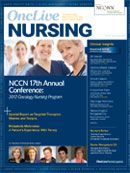National Comprehensive Cancer Network: Beyond the Treatment Guidelines
Each year at its annual meeting, the National Comprehensive Cancer Network presents updates to its Clinical Practice Guidelines in Oncology.
Lisa Schulmeister, RN, MN, APRN-BC, OCN®, FAAN
Editor-in-Chief OncLive Nursing
Oncology Nursing Consultant, Adjunct Assistant Professor of Nursing Louisiana State Health Sciences Center in New Orleans, Louisiana
Each year at its annual meeting, the National Comprehensive Cancer Network (NCCN) presents updates to its Clinical Practice Guidelines in Oncology. The NCCN also conducts an oncology nursing educational program at the yearly gathering. This month’s issue of OncLive Nursing highlights the 2012 NCCN Nursing Program, which was held on March 14 at the NCCN’s 17th Annual Meeting in Hollywood, Florida.
The full-day oncology nurse program was accredited for 6.85 continuing nursing education hours. Sessions were conducted by oncology nurse experts and certified genetic counselors from around the country. Our coverage spotlights key areas covered in the program, including genetic assessment of cancer risk, challenges with managing oral cancer treatments, management of dermatologic toxicities associated with targeted therapies, challenges and breakthroughs in cancer pain management, and essential components of survivorship care.
OncLive Nursing’s coverage of the NCCN’s annual meeting will continue in our May issue with a complete breakdown of the latest guideline updates. Guidelines covered will include colorectal cancer, Hodgkin lymphoma, non-Hodgkin lymphoma, advanced renal cell carcinoma, multiple myeloma, melanoma, lung cancer screening, non—small cell lung cancer, breast cancer, prostate cancer, ovarian cancer, acute lymphoblastic leukemia, and central nervous system metastases.
As a primer to our NCCN coverage, I wanted provide you with some background information on the NCCN itself. When I visited the NCCN’s website to conduct research, I realized that its operations were much more extensive than I had previously thought.
The NCCN is a nonprofit alliance of 21 leading cancer centers. As you are aware, it is best known for its oncology practice guidelines, recognized by many as the most frequently updated clinical guidelines available in any area of practice. The NCCN Guidelines are developed through an evidence-driven process with explicit review of clinical trial data by multidisciplinary panels of expert physicians from NCCN Member Institutions. Treatment recommendations are specific and can be easily implemented in any type of practice (eg, community oncology).
In addition to developing cancer treatment guidelines, the NCCN has developed guidelines for supportive care of patients experiencing fatigue, distress, and nausea and vomiting. There are also guidelines available on palliative care and use of myeloid growth factors. Some of these guidelines (eg, antiemesis and cancer-related infection) are available in pocket-size for easy access and reference.
The NCCN has also developed guidelines for cancer detection, prevention, and risk reduction. These include guidelines on screening for breast, colon, and lung cancer, as well as genetic/familial high-risk assessment of individuals at risk for breast and ovarian cancer. Age-related guidelines have been developed for adolescent and young adult oncology practice and senior adult oncology care.
To keep abreast of NCCN developments, oncology professionals can subscribe to NCCN Flash Updates, a service from the NCCN that provides timely access to updated and new information appearing in the NCCN Guidelines, the NCCN Drugs & Biologics Compendium, and other NCCN content. Additionally, archived and live webcasts (some with continuing education credit for nurses and physicians) are available on the NCCN website.
Print and electronic patient information on breast, colon, prostate, myeloma, and other cancer types is also available through the NCCN’s website. The purpose of the patient-directed materials is to provide patients with information that will help enable them to make informed decisions about their care. As noted in the patient guidelines, patients in smaller communities without access to a medical library or research center can learn about the latest clinical trial data.
“
When I visited the NCCN’s website to conduct research, I realized that its operations were much more extensive than I had previously thought. ”
One of the newest areas in NCCN development is creation of order set templates for chemotherapy, immunotherapy, and supportive care agents. The NCCN hopes that utilization of these treatment templates will help standardize cancer treatment, ensure that up-to-date treatment is provided, and reduce medication errors.
Another interesting area covered on the NCCN’s website is the section on global implementation of NCCN Guidelines. Many NCCN guidelines and resources are available in languages such as Spanish, Chinese, Japanese, and Korean. There is a great potential to implement the NCCN Guidelines worldwide.
If you equate the NCCN with treatment guidelines and not much more, as I initially did, take a look at its website. You, too, will be surprised at the diverse and clinically applicable resources available from the NCCN.

Innovative Program Reduces Nurse Turnover and Fosters Development
Published: September 12th 2024 | Updated: September 12th 2024The US Oncology Network (The Network) has developed one of the most comprehensive programs in the nation to support the professional development and retention of new oncology nurses.



